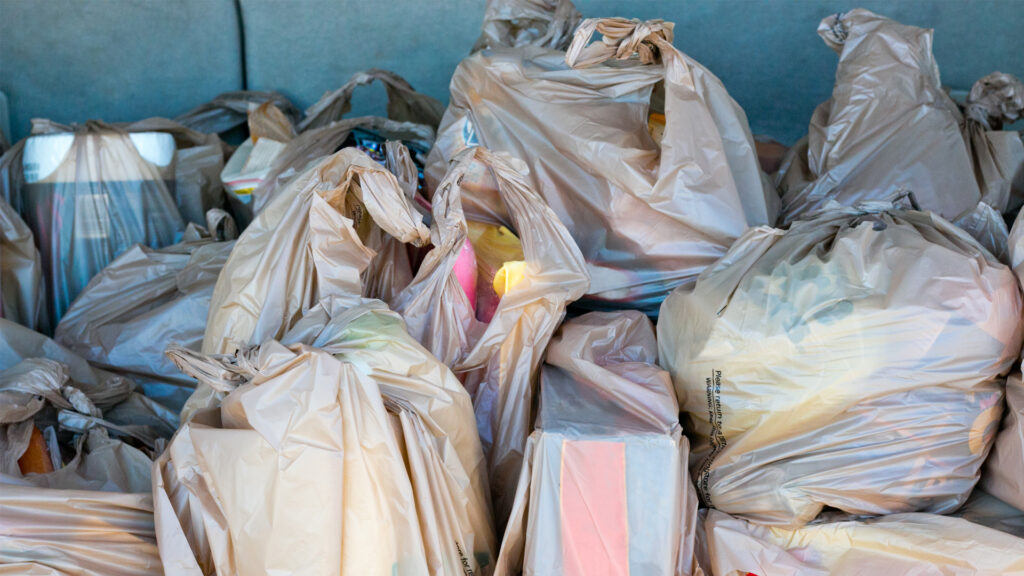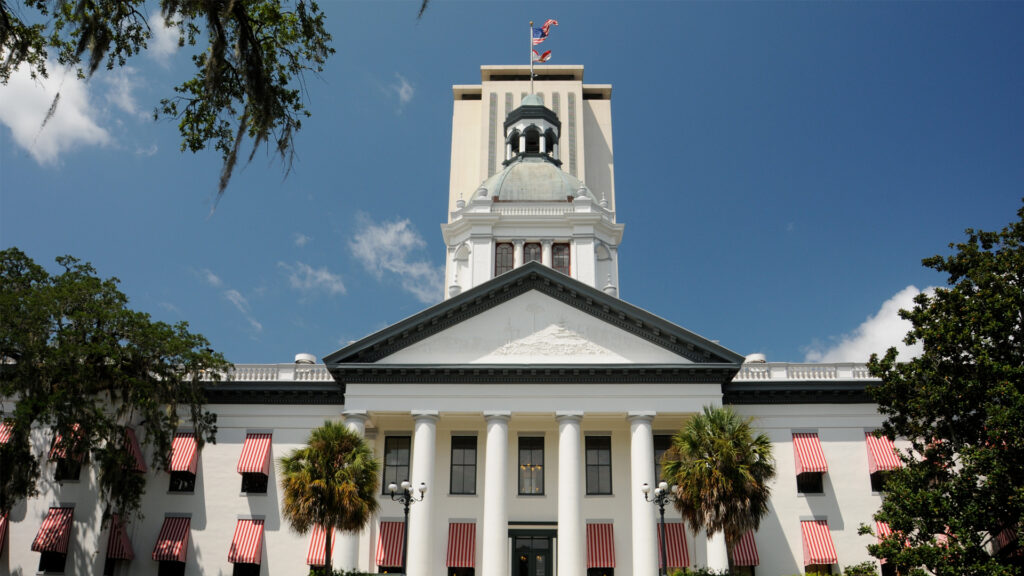By Mitch Perry, Florida Phoenix
Starting in January, most stores in Colorado won’t be allowed to provide single-use plastic carryout bags to customers without charging them a fee. Polystyrene containers, also known as Styrofoam, also will be banned at restaurants and wherever prepackaged, package foods are sold. Rhode Island’s ban on plastic bags also will launch Jan. 1, making them the latest states to enact such measures in the United States.
That makes 13 states across the country that ban the use of plastic carryout bags statewide, according to the Retail Industry Leaders Assocation.
More than a hundred local governments throughout the country have enacted laws as well – but in Florida, it’s illegal for any local jurisdiction to ban plastic or polystyrene. Environmental advocates say that’s a problem, and they contend the issue is only getting worse.

“One of the reasons that’s really pressing here in South Florida is we’re having a big waste management crisis, where we just are producing too much single use waste and we’re either landfilling or incinerating it, which are both bad for the environment. So the best thing to do is just to reduce the waste at the source,” says Catherine Uden, the South Florida representative for Oceana, an international advocacy group focused on ocean conservation.
Single-use plastics are products mainly produced from fossil-fuel based chemicals and are most commonly used for packaging and service ware, such as bottles, wrappers, straws and bags. And they’re all around us. According to the United Nations, around one million plastic bottles are purchased every minute and up to five trillion bags are used worldwide each year. And half of all plastic produced is designed for single-use purposes, used just once and then tossed away.
Plastic pollution has been linked to a variety of negative issues, including infertility and cancer in humans to severe injury and death in wildlife, according to a report from the National Defense Resources Council.
“The only way to deal with the plastic pollution problem is cutting it off at the source, and that is why we are seeing so many other states and entire nations passing policies to reduce single-use plastics,” says Uden.
19 states limit regulations on plastic bags
However, that’s not in the mood in Tallahassee, where Florida is among 19 states that have placed limitations on regulating plastic carryout bags, either in state statute or in their constitution, according to the Retail Industry Leaders Assocation, based on July 2023 data.
“Bans on plastic bags for stores and shoppers to switch to alternative products that are more expensive, often still made from plastic, cannot be recycled and have larger environmental impacts than the products that they replace,” says Zachary Taylor, the director of the American Recyclable Plastic Bag Alliance, an organization that represents the U.S. plastic bag manufacturing and recycling industry. “Shoppers can’t afford them, and it’s not clear that they’re more sustainable for the planet.”
Many shoppers who want to avoid using plastic bags substitute by using reusable shopping bags. Some of the most popular among a certain group of people use tote bags promoting brands like NPR or The New Yorker, both of which are made from organic cotton. However, an organic cotton tote needs to be used 20,000 times to offset its overall impact of production, according to a 2018 study by the Ministry of Environment and Food of Denmark (the study has not yet been peer-reviewed, according to the NY Times.)
The Florida Retail Federation also has always opposed the proposal.
“Florida’s retailers are working every day to serve customers while keeping costs low, ensuring the highest standards of consumer safety and reducing their impact on the environment,’ says Scott Shalley, president and CEO of the Florida Retail Federation, in a statement emailed to the Phoenix. “We are working collaboratively to pursue innovations and more sustainable practices. Imposing new regulations on Floridians often increases burdens and costs without achieving our shared goal of protecting the environment.”
Sen. Linda Stewart files legislation
Going back to 2008, local municipalities and counties have been preempted from banning single-use plastics in Florida.
And nothing has happened since on a statewide level.

Orange County Democratic state Sen. Linda Stewart has filed legislation (SB 498) that would remove the preemption of local laws regarding the regulation of disposable plastic bags and polystyrene. It’s a measure that she’s sponsored for years because she says such decisions should be made at the local level.
“Everything is different. You go down there to Key West, you got coral that is damaged because of all these plastic bags and plastic bottles,” she says. “We don’t have coral in Orlando. We have other things that cause our lakes and rivers to degrade, but that’s why it can’t be a one-size fits all. It has to be by each individual county or city to decide what the rule is for them because they’re the ones that have to deal with the cleanup and the mess that’s being caused.”
A more limited proposal that that would authorize coastal communities to establish pilot programs to regulate single-use products has been filed in recent years, also without success. The 2023 bill was originally sponsored by two Republicans – Ana Maria Rodriguez from Miami-Dade County in the Senate (SB 336) and Miami-Dade and Monroe County Republican Jim Mooney in the House (HB 363). Mooney later withdrew his bill.
“You know since this preemption has been in place for well over a decade, we don’t have a lot of good data on its efficacy or inefficacy at addressing the plastic problem and so giving a pilot we think would be one angle to do that in kind of a limited way,” says Emma Haydocy, the Florida policy manager with the Surfrider Foundation.
Plastic free
Some local communities – while not able to ban the use of plastics – are doing other measures to encourage businesses to reduce its use. Miami-Dade County in 2022 created Plastic Free 305, a voluntary tiered program where businesses in the country can start eliminating single-use plastic and share that information with the community.
A similar program, “Plastic Free Key West,” was created based on the same concept as Miami-Dade in recent months. Using an interactive map, citizens who want to patronize businesses that have pledged to remove single-use plastics can find them on the city’s website.
“Just being right on the coast we see the impact of single-use plastic pollution as well as other plastic pollution and this was just our first step to get businesses as well as customers involved to see the difference that a basic program like this can start,” says Taylor Tsacoumis, the program coordinator with Reef Relief. “It can hopefully create a snowball effect where businesses will start going plastic free. People will say to plastic bags and straws, not only in Key West but also wherever they’re coming from or going to.”

The Surfrider Foundation has also been calling on local governments and state legislatures to prohibit the intentional release of balloons, including those with mylar or labeled as biodegradable. Balloons pose a serious danger to wildlife, including marine mammals, seabirds and sea turtles, according to the Ocean Conservation Society. They can be mistaken for food by several marine species, and animals can die from starvation when balloons block their digestive tracts, or when they became entangled in balloon strings.
Tampa Bay House Republican Linda Chaney and South Florida Democrat Jason Pizzo filed such legislation earlier this year, and while it didn’t move in the 2023 legislative session, Chaney has refiled a similar version (HB 321) for the 2024 session.
Regarding polystyrene, the Florida Legislature passed legislation in 2016 that preempted the regulation of the use or sale of polystyrene products to the Florida Department of Agriculture. In 2021, then Agriculture Commissioner Nikki Fried that she had begun the rulemaking process to phase out the use of such products in 40,000 Florida grocery stores, convenience stores and other regulated businesses. Fried said in early 2022 that it would be up to the Legislature to bring the rule forward for ratification – but they have opted not to do so.
That rule would not have included restaurants, which use lots of polystyrene containers. But 19 restaurants have phased out of using polystyrene on their own, as part of the Surfrider Foundation’s Ocean Friendly Restaurants program, including the Cider Press Pub in downtown St. Petersburg.
“We still do not use any Styrofoam products in the restaurant,” business director Roland Strobel told the Phoenix in an email. “We even switched to recyclable/compostable straws several years ago.”
Florida Phoenix is part of States Newsroom, a network of news bureaus supported by grants and a coalition of donors as a 501c(3) public charity. Florida Phoenix maintains editorial independence. Contact Editor Diane Rado for questions: info@floridaphoenix.com. Follow Florida Phoenix on Facebook and Twitter. This piece was originally published at https://floridaphoenix.com/2023/11/29/more-states-are-banning-plastic-bags-florida-is-not-among-them/.
Sign up for The Invading Sea newsletter by visiting here. If you are interested in submitting an opinion piece to The Invading Sea, email Editor Nathan Crabbe at ncrabbe@fau.edu.



